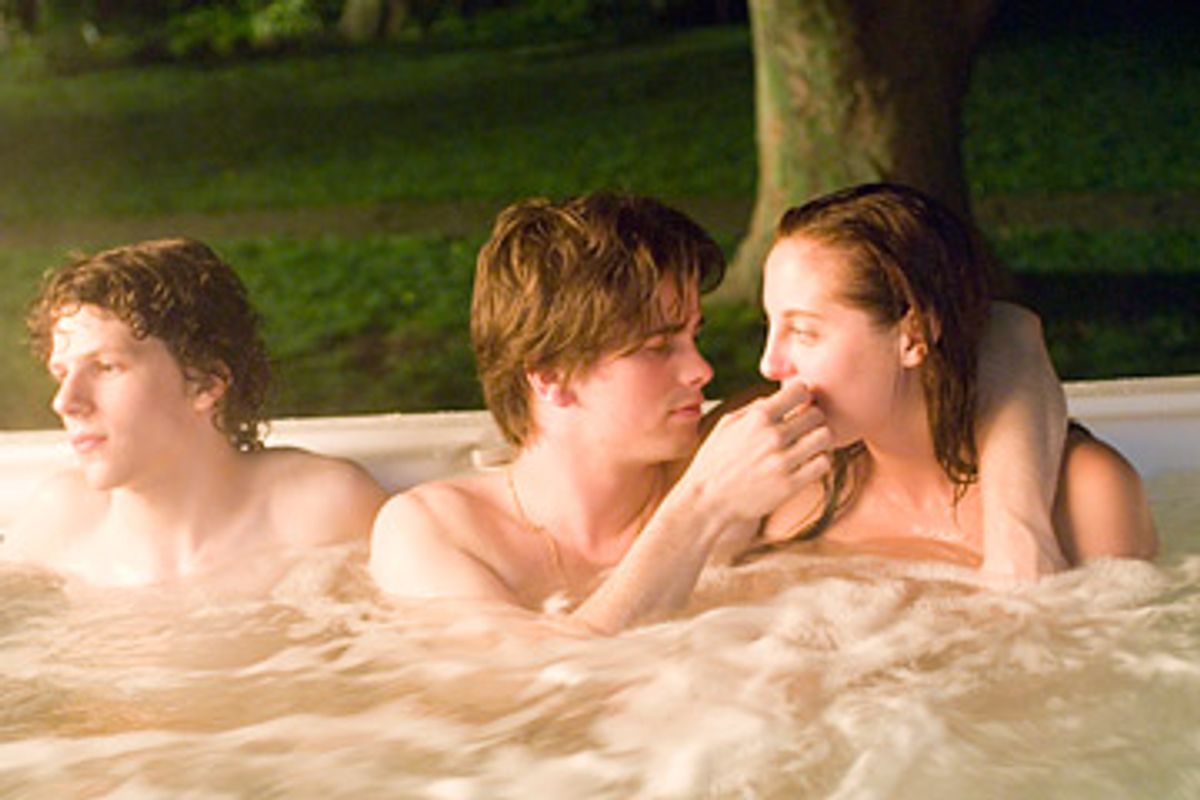"The Education of Charlie Banks" is extremely modest in its reach, which is both a plus and a minus. This is the directorial debut of Limp Bizkit frontman Fred Durst, and it's a surprisingly quiet, introspective picture. Jesse Eisenberg stars as Charlie, a gawky, bookish New York City kid who's both fascinated and repelled by a charismatic neighborhood bully, Mick (Jason Ritter). By the time Charlie goes off to an upstate college, he's practically forgotten about his old nemesis, although he does harbor a secret that has to do with Mick's violent tendencies. One day Mick shows up in Charlie's dorm room and insinuates himself into Charlie's privileged life: Charlie isn't exactly rich, but his dad owns a bookstore -- he comes from a family that values education and knowledge, while Mick is a troubled guy who spent his childhood in foster homes. Mick is thuggish, but there's a softer side to him, too, which Charlie has begun to hesitantly acknowledge, although it doesn't help that Mick is pursuing the rich girl, Mary (Eva Amurri, in a hard-nosed yet laid-back performance), Charlie has a crush on.
Durst -- working from a script by Peter Elkoff -- is a somewhat tentative filmmaker, which is understandable for a first time out: No budding director wants to make a mistake. But "The Education of Charlie Banks" would have benefited from a little more boldness, a little more clarity, particularly in the way the characters are defined. Durst may not yet know how to help actors shape their roles: You can see Ritter, as Mick, flailing a bit as he tries to walk the fine line between being a tough guy and a sensitive soul. At one point, after having finished "The Great Gatsby," he announces that it's the first time in his life he's read a whole book. While it's easy enough to believe the book has moved him, maybe even transformed him, other times, he's just being a regular old bully. Mick is obviously a conflicted figure, but sometimes his character's tics seem more like writerly conceits than believable human traits. With a little more guidance, Ritter (who resembles a young Matt Dillon) may have been able to turn this flawed role into a wholly believable character.
There's another problem here: Eisenberg's Charlie doesn't make a very charismatic central figure. It's fine that he's nerdy. But with his hunched-up walk, and with his mouth perpetually hanging open, Eisenberg often just looks as if he barely knows how to get by in the world. Charlie is an intentionally awkward character, but that means the performance has to be anything but awkward, and Eisenberg can't quite finesse it. (He gives a much better performance in the soon-to-be-released "Adventureland," as a recent college grad who takes a summer job at a down-at-the-heels Pittsburgh amusement park.)
But there's enough sweetness, and enough just-under-the-surface intelligence, in "The Education of Charlie Banks" to suggest that Durst may have a future as a filmmaker. He's clearly unafraid to tackle some sensitive, subtle issues; most notably, he explores the ways in which people take comfort in defining themselves by class. (Charlie and Mick bond by complaining about "fucking rich people," even though their circumstances are hardly similar.) And although Durst needs to develop a more confident touch, it's also easy to see that he wants to avoid the pitfalls of heavy-handed, clunky melodrama. Durst made "The Education of Charlie Banks" in 2007; in 2008, he released the comedy-drama "The Longshots," starring Ice Cube. Reportedly, he's slated to direct a horror movie next, but let's hope he doesn't entirely abandon small, independent pictures. In the press notes for "The Education of Charlie Banks," Durst cites Hal Ashby as one of his favorite filmmakers, along with the usual suspects like Woody Allen, Stanley Kubrick, Martin Scorsese and Francis Ford Coppola. Ashby, who died in 1988, made some marvelous pictures (like the 1975 "Shampoo") and some marvelously odd ones (like his 1970 debut, "The Landlord," starring a young Beau Bridges), and it's not all that often you see his name crop up as an influence. The fact that his movies mean something to Durst suggests that this nascent filmmaker may be open to fresh ways of seeing, and of thinking. And the filmmaking world needs more of that, not less.

Shares